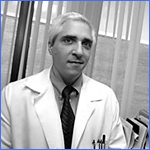Yale Darwinist Dr. Steven Novella Takes on the “Rubes”

Dr. Steven Novella doesn’t think much of people who disagree with him about Darwinism. Dr. Novella, a Yale neurologist, assistant professor and specialist in neuromuscular disorders, is also a ‘skeptic’ and co-founder and president of the New England Skeptical Society. He’s quite unskeptical about Darwinism:
…evolutionary theory is complex. Evolution is a beautiful and subtle theory — one of my favorite scientific theories to study. I have spent years reading about it, learning from the best like Dawkins, Leakey, and Gould…
He took issue recently with those of us who doubt the adequacy of Darwin’s theory to account for all natural biological complexity:
…there is enough complexity in all of this that if someone smart and eloquent — like ID’ers Behe or Demski [sic] — want to create confusion they easily can. They pull an intellectual three card monte and the evolutionary rubes buy it.
I’m an “evolutionary rube” myself. Dr. Novella insists:
This is not an excuse for Dr. Egnor’s ignorance — he threw his hat into the ring, he deserves what he gets. He should have had the proper humility to stay out.
Actually, all I did was ask a question: how much biologically relevant information can Darwin’s mechanism of chance and necessity actually generate? I didn’t settle for hand-waving or for reassurances that “Darwin’s theory is a fact.” I wanted a measurement of biological complexity, with empirical verification, in a way that was meaningful to biology. I never got an answer to my question.
Nonetheless, Dr. Novella is disdainful of Darwin-doubting “evolutionary rubes” who lack his immersion in the field:
Now I don’t blame the rank and file for not having read dozens of books and hundreds of articles on evolution. But I do blame them for thinking they deserve to have an opinion if they haven’t…
It seems that those of use who “don’t deserve to have an opinion” also haven’t been thinking the right way:
Also, it is obvious in their arguments that they do not have a proper mental image of what genetic information is like.
He tells us that “a proper mental image” of genetic information is books:
Each time this volume of books is copied there is the potential to make mistakes. Because of the complexity, the arrangement of paragraphs in a chapter can change, altering the meaning of the chapter in some way. Entire chapters that are active can become skipped, and vice versa. Entire chapters can be copied twice, and rarely entire volumes can be duplicated. Imagine the text of these books. A change might cause a sentence to go from “today is a sunny day” to “today is a foggy day” (remember, in this language every possible three letter combination has meaning — there are no nonsense words).
With a reasonable working model of genetics, it is much easier to imagine how shuffling around information, duplicating, and altering the information could easily result in meaningful and even useful new information.
Distancing himself from his literary metaphor (it’s hard for rubes to relate), he switches to a farm-machinery metaphor. Dr. Novella explains how Darwin’s theory of chance and necessity can account for all natural biological complexity:
Evolution is like a two-cycle engine: mutations increase the amount of information and then natural selection gives that information specificity.
Dr. Novella is missing a much better example of random mutation and natural selection that’s not metaphorical at all. Cancer is a test of Darwin’s theory. Cancer is real biological evolution by random mutation and natural selection, writ fast. There’s no reason to invoke encyclopedia typos or tractor engines in order to understand what “chance and necessity” can do to a living system. Brain tumors are perfect little Novellian “two-cycle engines” nestled inside the skull, “random mutations” coming out the ears, and “natural selection” like there’s no tomorrow (excuse the metaphors). Brain tumors are constantly generating new biological variation, and they are avatars of natural selection. They provide a tremendous spectrum of variation, from “variation jet-engines” like malignant glioblastoma multiforme to “variation tortoises” like benign pilocytic astrocytomas. Cancer wards are full of patients brimming with “two-stroke engines” of evolutionary change.
Dr. Novella, again:
…it is [easy] to imagine how shuffling around information, duplicating, and altering the information could easily result in meaningful and even useful new information.
The best real biological test of “shuffling around information, duplicating, and altering the information” is cancer. According to Dr. Novella’s reasoning, brain tumors ought to be generating quite a bit of “meaningful and even useful new information.” Better neuroanatomy and better neurophysiology ought to be popping up “easily.” Better frontal lobes and cognition, from cancer. Better temporal lobes and memory, from cancer. Better cerebellums and coordination, from cancer. If random mutations and natural selection–Dr. Novella’s “two stroke engine”–is the source of all functional integrated biological complexity, brain tumors ought to help our brains evolve in some way.
Perhaps Dr. Novella has data that show real evolutionary improvements in the brain caused by brain tumors. If he has, he should show us.
I’m just a rube, not a Darwinist from Yale. But I’ve never seen cancer make a brain better.
